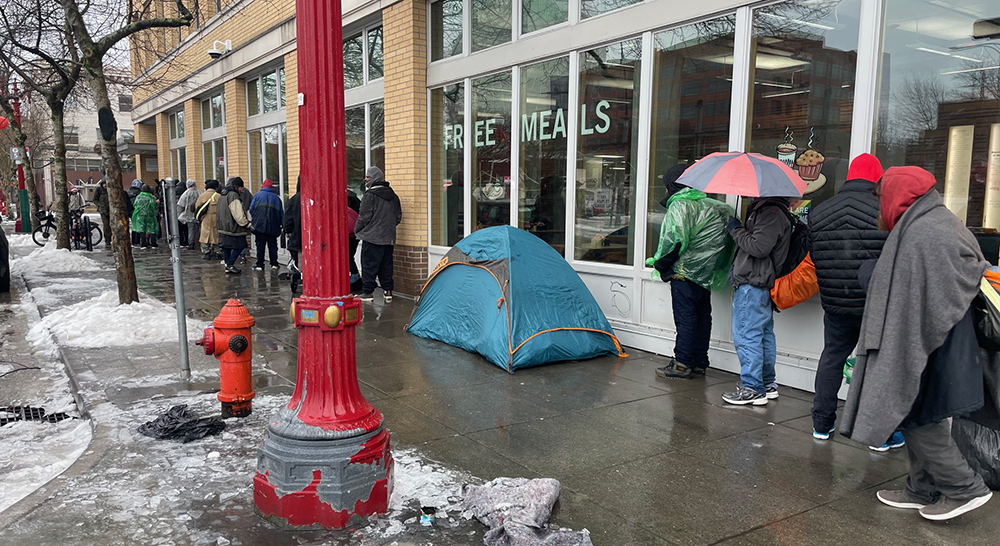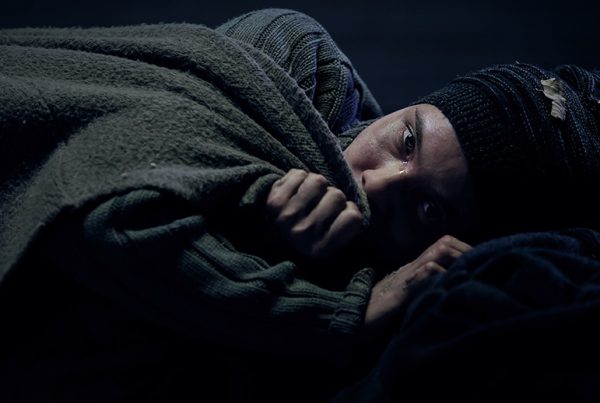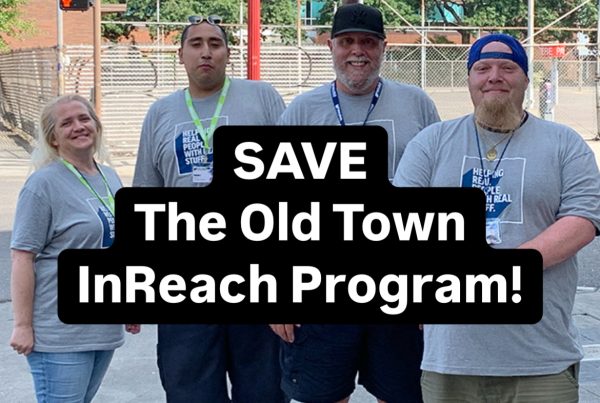The 2023 Point-in-Time (PIT) count of homelessness recorded 20,110 people experiencing homelessness across Oregon.
Recently, Portland State University released its highly anticipated 2023 Point-in-Time (PIT) count of homelessness findings. This biennial nationwide effort aims to estimate the number of individuals living unsheltered or in shelters during a single night in January.
The report’s findings validate what we already know at Blanchet House, that the need for our services increased. 2023 was a record-breaking year for our free meal program, with more than 330,000 plates of food served. Alongside food, we provided thousands of pounds of clothing, shoes, and hygiene care kits. We witnessed long lines of people in need at nearly every meal hour, which gave a visual emphasis to the stark reality of the homelessness crisis and the individuals suffering through it.
According to the 2023 PIT report, Multnomah County witnessed a staggering 29% surge in unsheltered homelessness. This closely mirrors Blanchet House’s 28% increase in meals served compared to 2022.
The report showed an 8% increase in individuals staying in shelters in our community. It’s important to understand that many people seeking hot meals at Blanchet House reside in shelters or low-income housing. They need food support because they are unable to prepare meals due to various challenges, such as income, age, or disability.

A woman puts on dry socks and shoes in the cafe at Blanchet House. The 2023 Point-in-Time (PIT) count of homelessness report shows an increase in women experiencing homelessness in Portland, OR. Photo courtesy of AP News/Jenny Kane.
Point-in-Time Shows Increase in Women Experiencing Homelessness
One striking revelation from the report was the number of women experiencing homelessness in 2023. The report showed that 43% of unsheltered individuals in Multnomah County were people who identify as female. This statistic was not surprising to us at Blanchet House, nor likely to our peers at Rose Haven, a nearby day center for women.
Increase in Older Adults Experiencing Homelessness
Alarmingly, the report stated that 42% of unsheltered persons were aged 45 years or older with nearly half of this demographic aged 55 or above. At Blanchet House, we serve an increasingly aging community, many of whom grapple with physical disabilities, chronic illnesses, and even symptoms of cognitive decline.
Disparity of BIPOC Community Experiencing Homelessness
The report also underscored the glaring racial disparities in homelessness, with Black, Indigenous, and people of color (BIPOC) community members disproportionately affected when compared to the overall population.
But homelessness is more than just numbers. It’s a deeply human issue. Behind each number lies a story of profound human suffering, often stemming from significant trauma and adversity. It’s the story of an aging population confronting destitution and isolation in their twilight years, of women fleeing violence only to find themselves vulnerable on the streets, and of systemic injustices perpetuating cycles of poverty and discrimination.
Yet amidst these challenges, there are glimpses of hope. At Blanchet House, we witness individuals overcoming extraordinary odds, finding purpose in work, and embarking on a journey of recovery. These success stories of resilience and compassion remind us why we do what we do and why we never give up hope for people.
Our efforts may sometimes feel like an endless uphill battle. Akin to Sisyphus pushing the boulder up the mountain only to have to do so again and again.
But perhaps our true impact lies in preventing the boulder from ever hitting the ground.


















